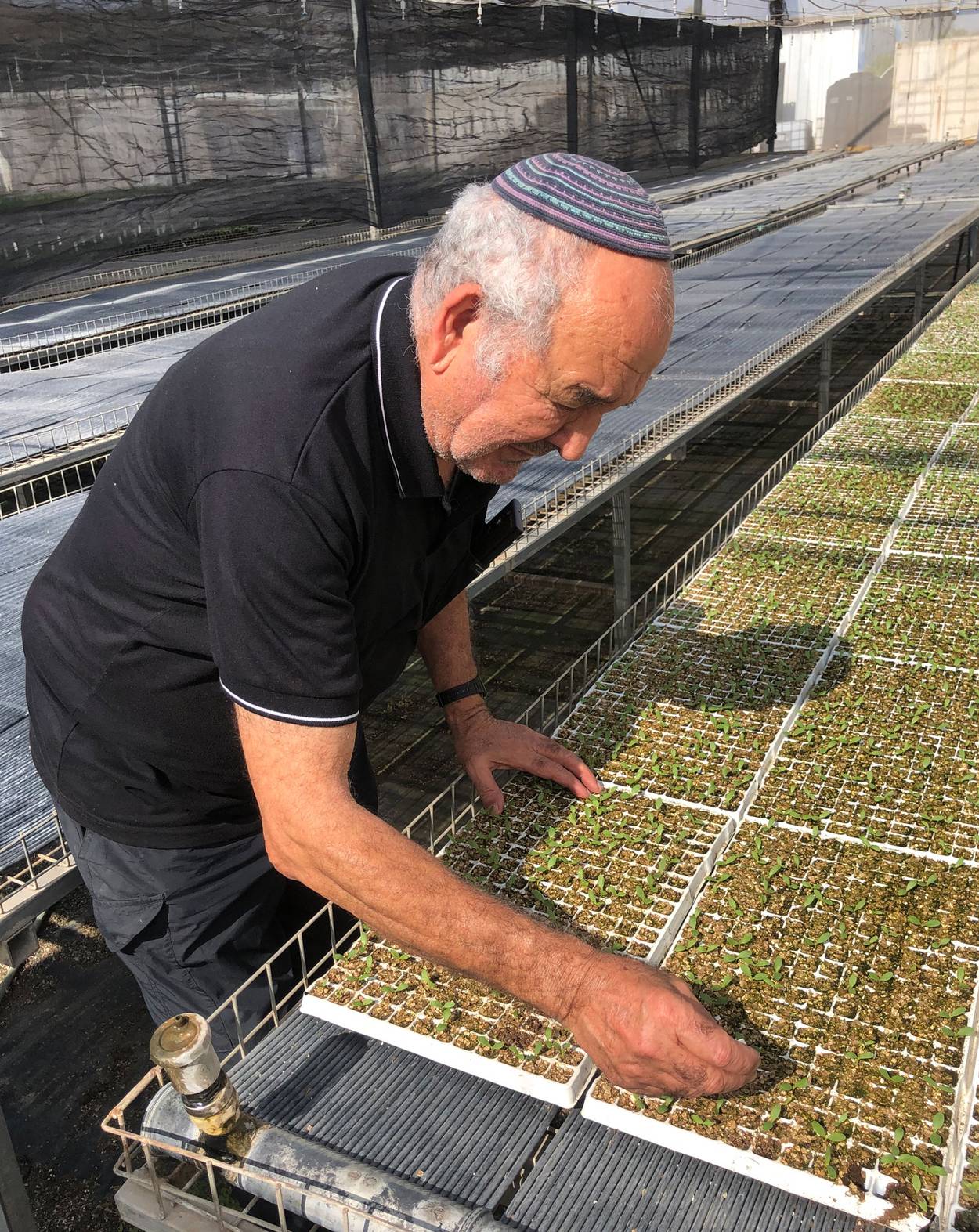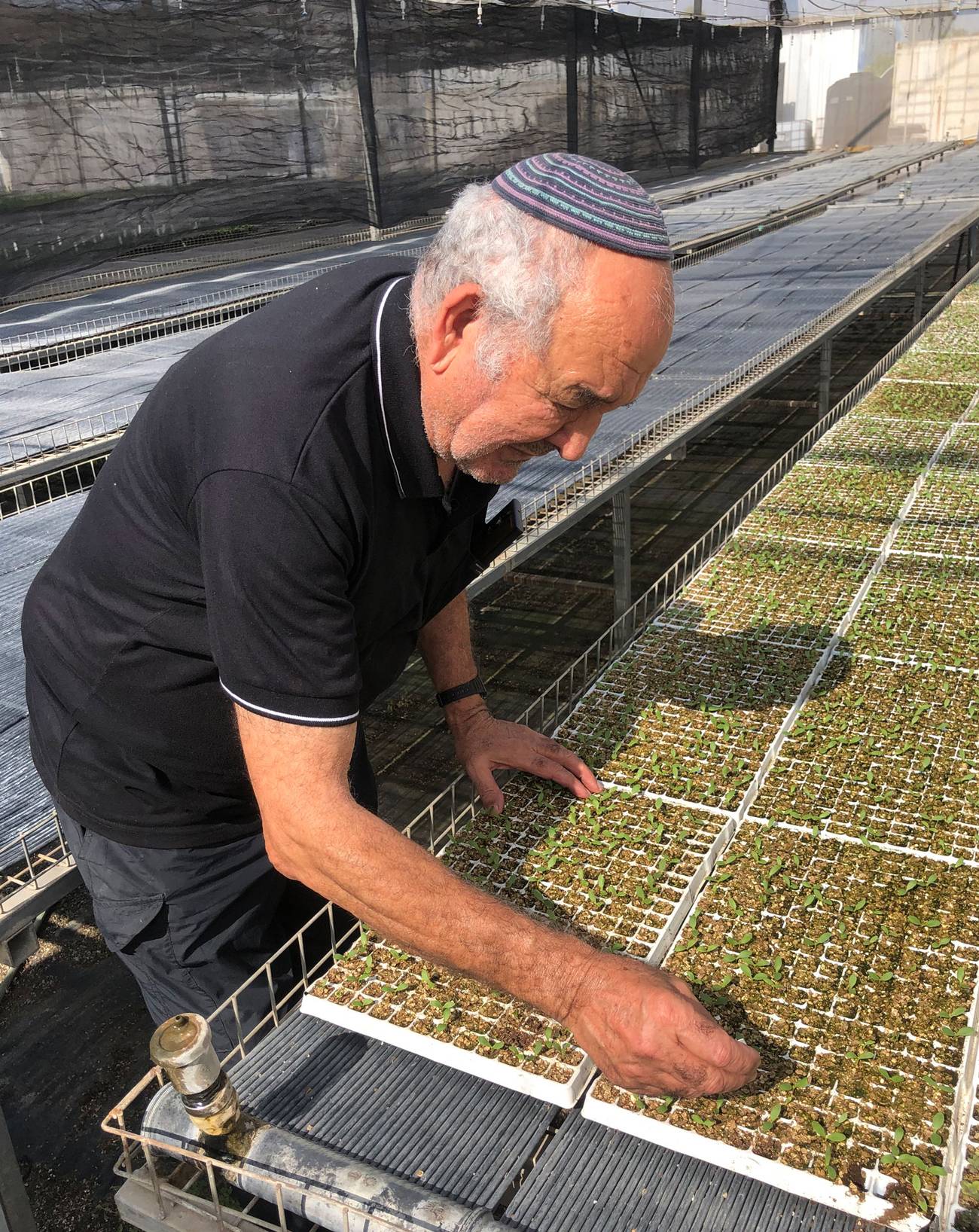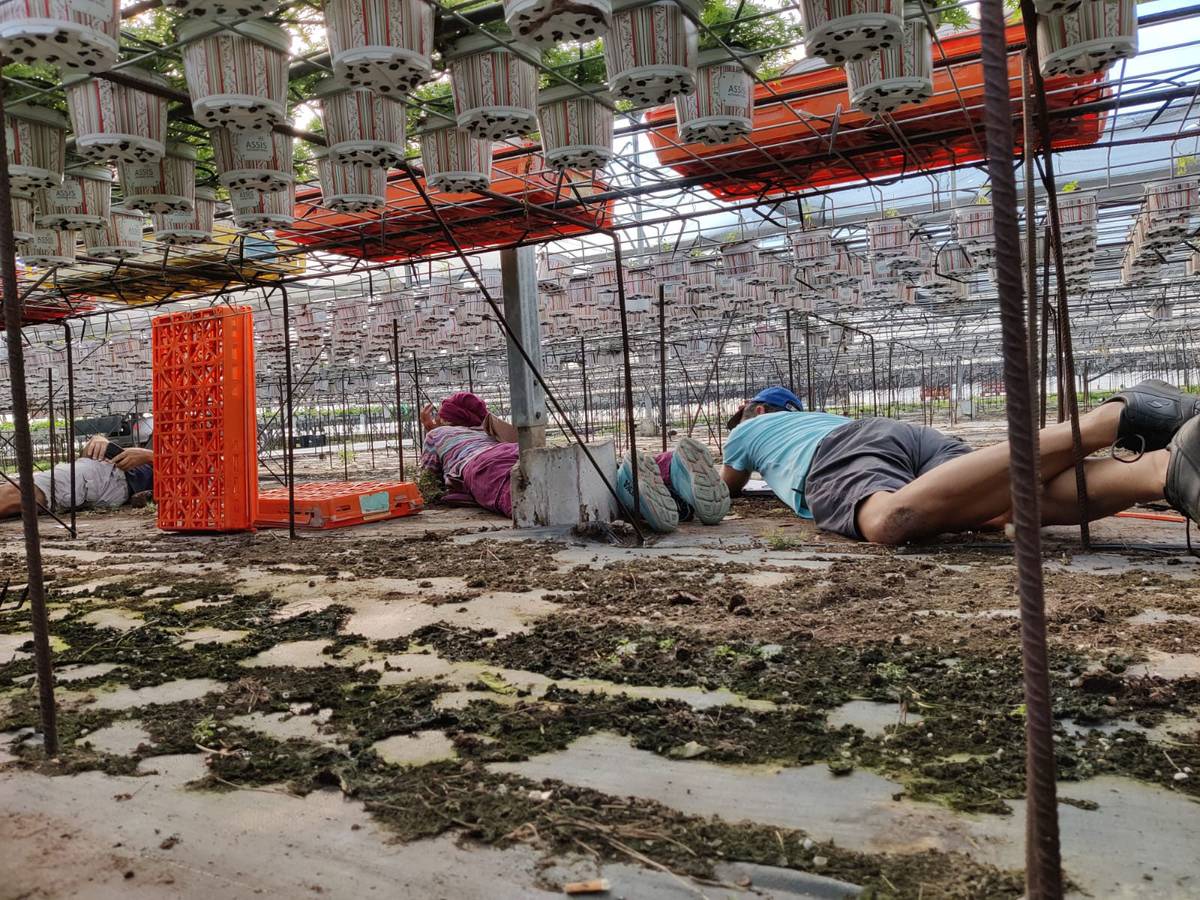At 2:30 p.m. last Wednesday, an Israeli air-raid siren shattered the calm in a massive greenhouse at Assis Nurseries, south of Ashkelon, while I was there conducting interviews. With no bunker or fortified room nearby to take shelter in, the nine people working there and I prostrated ourselves on the dirt and covered our heads with our hands.
No pop was heard from an Iron Dome interception of the missile that was launched from the Gaza Strip, the Hamas-ruled territory two miles away; no smash of concrete, shattering of glass, or worse, screams to attest to a hit. The projectile likely landed in an open field.
The coast was clear, at least for now, so the workers resumed what they were doing: pressing black irrigation tubes into the soil of potted pansies and bidens. They’d spent much of the morning consolidating some of the greenhouse’s thousands of pots to free metal racks, each more than 100 feet long, to hold flowerpots of new growths.
Two of them were employees from Thailand. The rest were volunteers. One was an American man living in Europe who’d arrived in Israel two nights earlier for an open-ended stay. The others were Israeli: two men, tour guides, originally from Minneapolis and Buenos Aires; a couple from the Hebron Hills, with the wife—also a tour guide—having suffered Hamas’ murder of her first husband, a shepherd, in 2001; a woman from a nonprofit organization that assists farmers; and a man who sells peat to the greenhouse.
Their volunteering fills a critical need in Israeli agriculture, which in 2021 brought in 32 billion shekels ($8 billion), accounting for 2.5% of the country’s gross domestic product. Severe labor shortages have hampered kibbutzim, moshavim, and other farms following Hamas’ Oct. 7 massacre of 1,400 people in Jewish communities near Gaza and its kidnapping of more than 240 people.
Several of the Assis volunteers said the crisis has reminded Israelis of agriculture’s being a vital national-security interest. Some hope that Israelis support Israeli tomato farmers rather than buy cheaper tomatoes imported from Turkey, whose president, Recep Tayyip Erdogan, has publicly criticized Israel and supported Hamas during the war.
The shift in recent decades of kibbutzim away from farming and toward industry “hurts our ability to feed ourselves as a country” and is “an existential issue,” one volunteer, Dalya Har-Siny, said. “We all have to eat.”
The shortages extend far beyond the kibbutzim attacked and later evacuated because terrorists remained at large—communities that remain empty due to Israel’s war against Hamas.
The need for farmworkers extends nearly countrywide.
Farmers I interviewed pointed to three additional categories of workers accounting for the shortfall: foreigners who returned to their homeland or relocated to other locations in Israel following the attacks; Palestinians now barred by Israel; and called-up reservists.
Nursery workers respond to the sound of an air-raid sirenTali Almoz
According to Israel’s Ministry of Agriculture and Rural Development, farm work employed 74,000 people in 2021. Thirty thousand of them were foreigners, 6,700 of whom returned home since the war began. Another 9,000 Palestinians were working in Israeli agriculture but aren’t now.
Nonprofit organizations, grassroots groups, and companies that mobilized to aid citizens in need during the ongoing crisis include those recruiting volunteers out of concern that farmers could lose their livelihoods.
The support has been personal, with one agronomist offering free consultations.
It’s been regional, with produce transported from farms in the Gaza envelope—the area Hamas ravaged on Oct. 7—to shoppers in malls in Tel Aviv and Haifa on Fridays, when Israeli weekends begin. People stand in line for hours to make their purchases in what amount to indoor farmers markets. It’s been national, with television commercials for the Shufersal supermarket chain promoting its providing emergency aid to farmers.
In the week since I began researching the war’s effects on Israeli agriculture, aid programs and sales pitches have popped up continuously on Facebook.
“Our strength and our victory are tied up in activity and continuity, and you can help,” reads one from Ets Hasade, a moshav near Binyamina producing olive oil. “Support Israeli agriculture now,” another of its notices reads.
“Produce from the Gaza Envelope, the south, the north, and locally. Friday, November 3, 8:00 a.m. to 2:00 p.m. at the Emek Hefer Industrial Park,” reads a promotion in green letters against a photo backdrop of a field.
A post by Leket Israel, the National Food Bank, shows a soldier holding a helmet filled with apples.
Meiri Farm, on Moshav Achituv, shows cucumbers overflowing plastic crates in its post and hints at another segment of the economy that’s been affected: distribution. The post reads, “We picked cucumbers this morning at our farm and have no one to market them to. You’re invited to come. A 10-kg [22-pound] box for 30 shekels [$7.65].”
“We need armed volunteers to secure farms,” reads a promotion for HaShomer HaChadash (The New Guard), an organization established in 2007 to protect farmers from theft and land encroachment.
“Right now we’re sustaining farmers, helping them in these challenging times,” said Shmuel Sackett, a New York native living in Herzliya who heads Am Yisraeli Chai, another nonprofit organization that, in normal times, provides farmers with startup assistance but is now in rescue mode. “We’ll help them get back. We’re getting SOS calls.”
One farmer Sackett mentioned being concerned about is Shalom Hemo, who runs a 20-acre farm—half avocados, half parsley and dill—on Moshav Mavkiin, just north of the Gaza Strip, close to Assis Nurseries. It is harvest season for avocados, but the military has prevented Hemo from picking them because several Hamas-launched missiles lie there, unexploded.
You can’t be a farmer without being an optimist.
“Until it’s cleared, I can’t go back,” Hemo said by phone. His four Thai workers have left the country. Five of his neighbors’ Thai field hands were murdered on Oct. 7.
His gross sales reach about $250,000 annually, Hemo said. He now worries about losing his entire crop.
“I’m not getting by. I have a complete lack of certainty,” he said. “They removed us from our house and we are living in a hotel. My son now is in a tank unit in Gaza. Thank God, he is OK.”
Just down the road, Assaf Assis, owner of the eponymous nursery operation, sped his golf cart along the concrete paths running through nine greenhouses, where he grows 20 acres of sage, thyme, rosemary, basil, lavender, mint—and petunias, geraniums, cyclamens, snapdragons, and too many cacti and other plants to count. He took sharp turns between buildings, impervious to the ground’s crunching underneath and to his passenger’s white-knuckled grip of the seat frame.
Assis, 73, is a bundle of energy, stories, wisdom, and experience; a Zionist, observant—he knowingly snatched his kippah and clutched it before each flying turn to prevent momentum and speed from carrying it to another continent—a philosopher and a people person.
Booms from Israeli artillery launches and the tk-tk-tk-tk sound of military helicopters constituted barely noticeable, to Assis at least, background noise puncturing his tour of the grounds. “You have to know the sounds of music,” he quipped.
Assis isn’t overly concerned about the war, his proximity to Gaza, or the potential of suffering financial loss, even though wholesalers, the bulk of his market, aren’t buying much now. He shrugged off setbacks as opportunities to regroup. He projected the resilience that’s seemingly ingrained in the psyche of the Israelis of legend.
“In times of danger, you see the good things,” he told a visitor, offering up the tale of Rabbi Akiva, who, walking with somber colleagues amid Jerusalem’s rubble following the Second Temple’s destruction, laughed at spotting a fox. This reaction stunned the others. The sage cited a prophecy stating that salvation would follow such a sighting.
“When you fall, don’t focus on the falling, but on using that momentum to spring back up,” Assis said.
Assis knows of what he speaks. He established his company in 1986 in Gush Katif, a center of Jewish life in the Gaza Strip, then relocated it here following Israel’s withdrawal from the territory in 2005.
Fighting in a tank unit in Sinai during the War of Attrition was an example of adversity providing him “a push forward,” he said.
He stopped the cart and gave his right thigh a hard smack. A loud knock, actually.
“I left it in Sinai,” Assis said of his leg, surely his go-to gag line.
I asked how that happened.
“All of my stories are hard to tell in a short version,” he said. In Hebrew, that last phrase is an idiom. It’s stated as ahl regel achat, as in: in the limited time a person can balance on one leg before falling. Assis ended up that way when he stepped on a mine. Earlier in his service, an Egyptian bullet passed through one side of his helmet and exited another, causing little damage to his face.
Three-fourths of the way down the concrete path of this greenhouse, the one where all the work was being done on this day, Assis again stopped the cart. One volunteer, Baruch, the Minneapolis native, was holding the remnant of the motor from a Hamas-launched missile. The Iron Dome had crushed it hundreds of feet above this spot on Sunday, Oct. 22. The falling debris created a 15-by-20-foot hole in the nylon netting covering the greenhouse and a crater in the dirt floor. Hundreds of white flowerpots lay scattered across the ground and a table was on its side.
Looking on was Gustavo Waisman, the Argentina-born guide. With tourism shuttered by the war, he had no clients. Someone in his WhatsApp group of guides suggested they lend a hand to short-handed farmers, so he came.
“If they can make a living and keep open, that’s the point,” Waisman said of the nursery. “We can’t let the economy fall.”
Har-Sinay has no one to guide either. She came, in part, in gratitude for the volunteers who, 22 years ago, kept her family’s farm—with a vineyard, sheep raising, and a flour mill—going after the murder of her husband, Yair.
“I know the importance of it,” she said.
Jimmy, the American living in Europe, came “to work, to help in the tiniest possible way.” He had visited Israel before, but being in the greenhouse now, at wartime, with the other volunteers and staff, he said he realized that “everyone has sons, daughters, grandchildren doing the real work [in the military], in harm’s way.”
The group walked along a concrete path several hundred yards to a table outside the office to partake in the simple lunch the nursery provided: make-it-yourself sandwiches of pita and sliced meat. A few hours earlier, Assis, myself, and several others had huddled in the office when a siren sounded.
“You’d have to be in denial not to feel a sense of danger, but not in a fretting sense. This place feels very safe, because these guys’ sons and daughters,” Jimmy said, extending his arm, “are fighting on our behalf.”
The nursery needed the help. Its staff of 50 was down to 14. Twelve of the company’s 22 Thai farmworkers preferred leaving the Gaza envelope but not the country, so Assis moved them to jobs in the Negev and the Arava desert. Eleven Israelis were away in reserves, and five other Israelis were evacuated elsewhere with their families from some of the invaded communities. Eight of his Arab workers from Hebron couldn’t cross legally into Israel.
Later, while driving me again, Assis told another story, about a lawyer, a doctor, and a farmer considering a change of professions. The farmer maintained that, even following a harsh winter, he’d stick with it.
“The next year will be better. You can’t be a farmer without being an optimist,” Assis has the farmer saying, before himself adding: “The Jew is a farmer, optimistic.”


